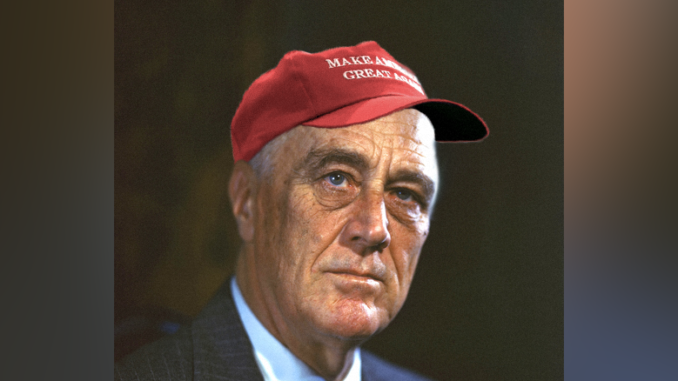
On July 29th a former Attorney General, while making a statement about immigrants, quoted a man responsible for sending thousands to concentration camps. One would expect outrage from the media and calling out the tastelessness or subject…except the Tweeter in question was Eric Holder, and he was quoting Franklin D. Roosevelt:
Return ALL of the separated children. pic.twitter.com/BCy0NJSNdE
— Eric Holder (@EricHolder) July 29, 2018
I’m sure Holder felt safe using the architect of Japanese internment to criticize Trump’s policies. After all, FDR was regarded by many as America’s best president and Trump has been deemed as its worst. However, it seems Trump and Roosevelt have more similarities than either side will admit. (Washington Times, New York Times)
Both were born to wealthy New York families, raised among riches, yet fancied themselves champions of the downtrodden working class folks.
Neither of them came into the White House with a concrete plan, only a promise to surround themselves with “the best people” or, as Roosevelt said, “I’m not the smartest fellow in the world, but I can sure pick smart colleagues” (ABC News, BrainyQuote)
Both Trump and Roosevelt have had famous “bromances” with Russian tyrants. Trump and Roosevelt saw Putin and Stalin, respectively, as strong populist leaders who weren’t afraid to use their iron fists to remind their populace who was in charge. (Time)
Roosevelt nominated Hugo Black as a Supreme Court Justice but conveniently omitted Black’s history as a member of the Ku Klux Klan. I’m sure if they were in the same room, Trump would offer sympathy to Roosevelt’s dilemma, himself having a complicated relationship with racism both before and during his presidency. (timeline.com, PBS)
Supporters of both Trump and Roosevelt will defend their “camps.” If you ask an FDR fan, they will describe the Japanese concentration camps (a word used by Roosevelt himself) as a mistake made in the heat of the moment, a sad reactionary response to the attack on American soil. In actuality he’d been trying to get those camps put into place a full five years before the attack on Pearl Harbor. Similarly, Trump apologists will defend his “summer camps” as simply a way to sort out the immigrants and assess their legal status, the people behind the program of separating families did so, not with the interest of the children in mind, but as a deterrent to future immigrants who, upon seeing what happened to the families before them, may not even try to gain asylum. (Encyclopedia Densho, Washington Post, The Hill)
Most recently the question of farmer bailouts has come up. Trump has pledged a $12 billion aid package to give farmers relief from the hardships they’ll face under his tariffs. This brings to mind Roosevelt’s Agricultural Adjustment Act, part of which included paying farmers off for their unsold crops and livestock. The effects of the AAA included raising the price of food during a time when many Americans were already struggling, and thus leaving them even more dependent on New Deal projects. The effects–or even who will benefit–of Trump’s bailouts have yet to be seen, but I’m not holding my breath that they will be any more successful than his predecessor. (NBC News, US History.com)
Trump himself is among FDR’s admirers. During his first cabinet meeting, Trump stated only Roosevelt had accomplished more in his first days in the White House. For Trump to make that kind of concession is quite notable. Mind you, it’s just a statement about the amount of legislation, not whether or not it was beneficial to the nation. (TheHill)
Trump has become the hero of the Neo Republicans, despite his many flaws. Roosevelt is the modern hero of the Democratic Socialists despite his failures. The similarities don’t end with the presidents themselves, but continue with their fans. The Democratic Socialists desperately want to Make America Great Again, the way it was in 1942. Sounds familiar. What concerns me most is Roosevelt’s three terms. I, for one, hope the similarities don’t continue from there.
